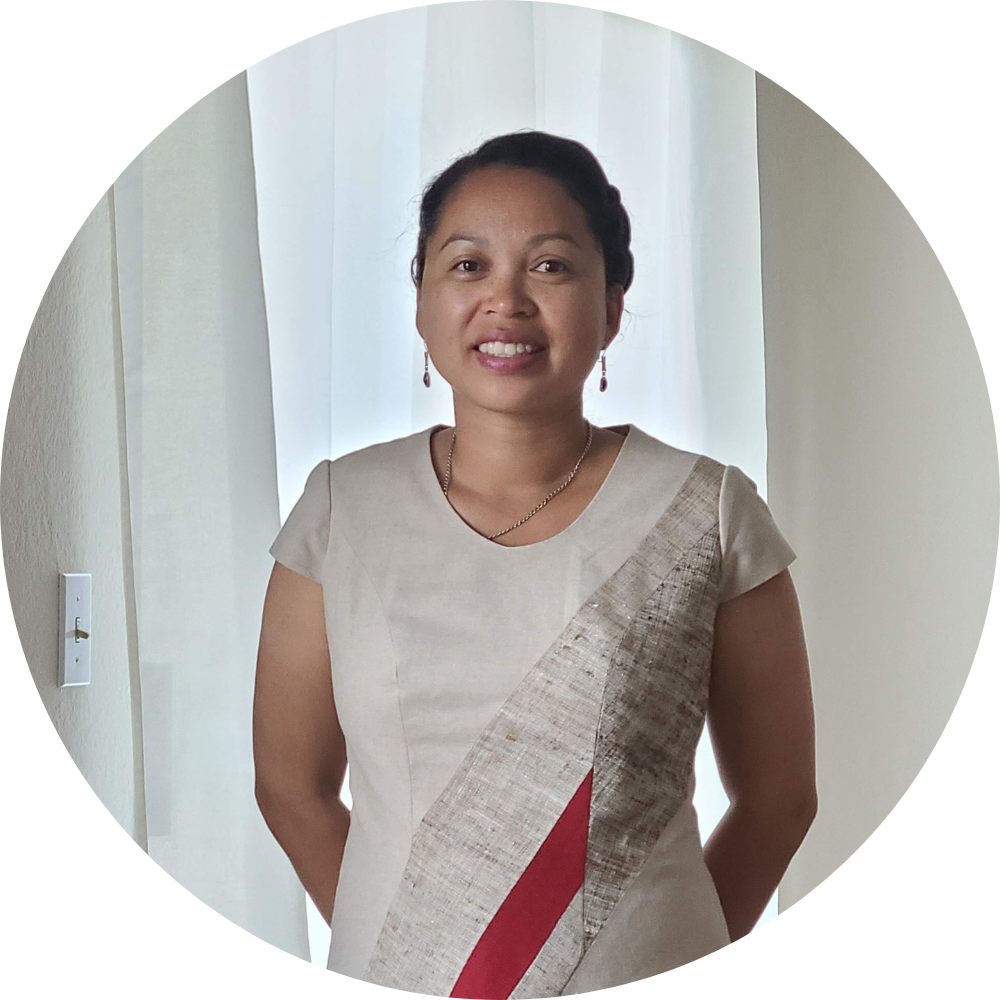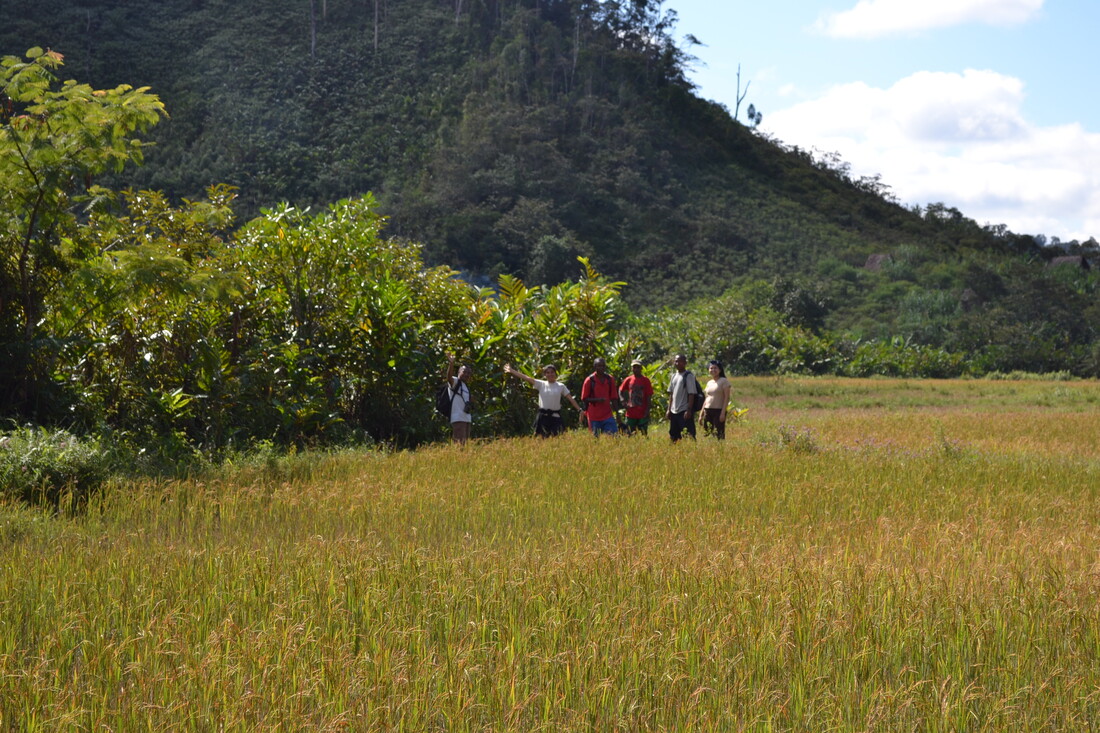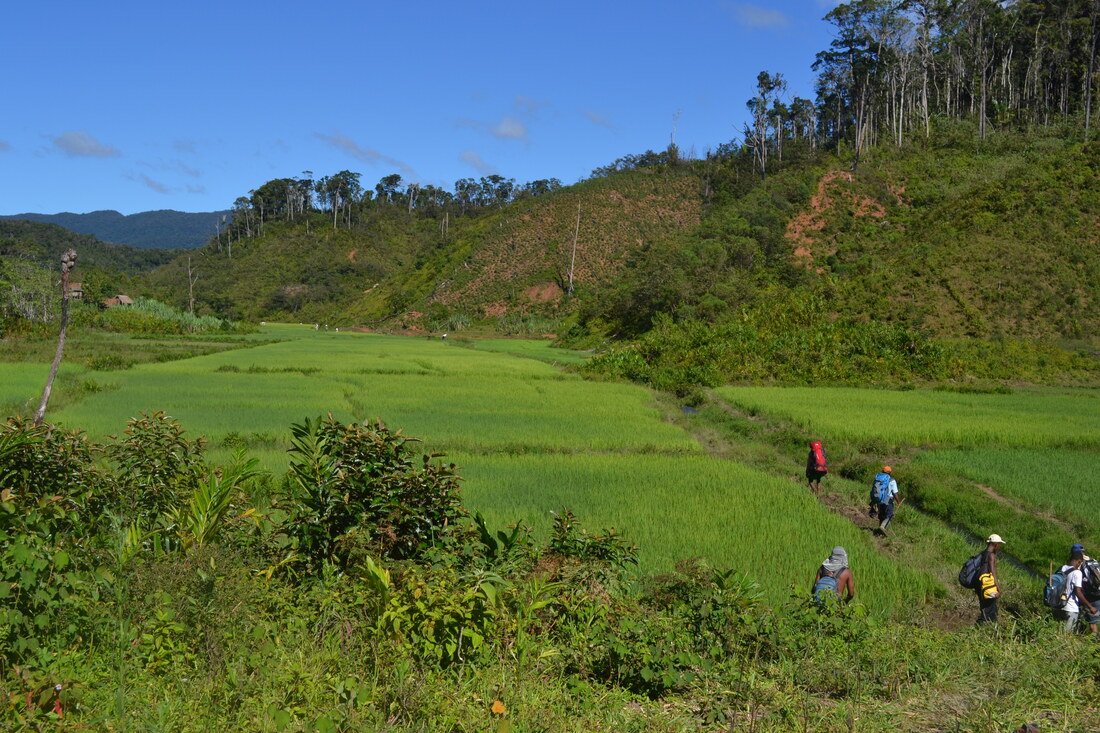Principal InvestigatorOnja H. Razafindratsima, PhD
|
I am thrilled to be part of the faculty within the Department of Integrative Biology at UC Berkeley. I am also currently a National Geographic Explorer. I am an ecologist with a strong passion for tropical ecology and conservation. I have always been fascinated by the interactions between animals and plants, how such seemingly simple process has a vital role influencing the survival of the interacting species. I started exploring this interesting concept when I was a Master student, by focusing on the role of lemur frugivores as seed dispersers of their food plants in the rainforests of Madagascar, and my findings led to more interesting questions to explore about this concept that most of my work now revolves around plant-frugivore interactions.
I grew up in the city of Antananarivo in Madagascar. My passion for nature started when I was in high school where I became actively involved in a club for young environmentalists. A field trip within this club brought me to the rainforest of Ranomafana National Park to learn more about Malagasy biodiversity. There, I encountered a group of scientists conducting field research that involved watching animals every day while camping in the rainforest. This idea fascinated me and sparked my interest to enroll in natural sciences at the University of Antananarivo, where I later completed a BSc and a Master's degree in Animal Biology, Ecology, and Conservation.
My passion for studying lemur ecology started when I was paired to work with Dr. Barabara Martinez as her mentee when I was a Master student in 2006. At that time, she was a PhD student from the University of Minnesota conducting field research on the ecology of red-ruffed lemurs in the northeastern part of Madagascar. This mentoring scheme was part of a requirement for foreign researchers conducting research in Madagascar to increase the capacities of local scientists. It changed my future and career trajectory because I was not only drawn toward studying lemur ecology as well but I also got interested in pursuing a PhD in the US. In 2009, I was accepted to embark in a PhD program in Ecology and Evolutionary Biology at Rice University, working with Dr. Amy Dunham, as an International Peace Scholar, and later a Faculty for The Future Fellow and a Baldwin Fellow.
Being a PhD student was not easy, especially the part where I had to write and explain my thesis in my third language. But it was very fulfilling in many ways. Throughout my PhD journey, I was awarded several prestigious fellowships, research grants, and presentation prizes at conferences (full list in my CV). My thesis even received the best thesis award in the Ecology and Evolutionary Program at Rice U. These recognitions have been very encouraging and empowering...
After graduating from Rice U. (2015) and a year of postdoctoral position in the same lab, I was selected as a Hrdy Fellow in Conservation Biology at Harvard University, hosted by Dr. Charles Davis in the Department of Organismic and Evolutionary Biology. As a Hrdy Fellow, I had the opportunity to lead an independent research project and teach an undergraduate course on Conservation Biology (2016-2017). I further gained more teaching and research experience as a Visiting Assistant Professor at the College of Charleston (2017-2019) and Assistant Professor at South Dakota State University (2019-2020).
Besides my research and teaching roles, I have also been actively engaged in various activities serving the community of scientists at various aspects. For instance, I served as a Council member of the Association of Tropical Biology and Conservation (ATBC), an officer of the Africa Chapter and co-chair of the capacity building committee of the association. I also participated on the grant committee of the International Primatological Society and as an expert on the Global Forest Export Panel (GFEP) along with other scientists, scholars and economists from various institutions to analyze the role of forests in poverty alleviation. Additionally, I serve as an Associate Editor for the International Journal of Primatology and the journal Ecology & Evolution.
Because of my background as a first-generation with higher education degree and female scientist, from one of the poorest countries in the world, and my experience in interacting with students from various backgrounds, I have a deep understanding of the importance of multicultural diversity in higher education as well as the recognition that the continued advancement of STEM fields will require unconventional thinkers with a diversity of perspectives. I am committed to contributing to increasing diversity in STEM by being involved in various activities. My efforts toward this goal include fostering an inclusive environment in both my research and teaching, organizing capacity building activities for Malagasy graduate students, mentoring students from underrepresented groups in various aspects of scientific research, and being actively engaged in groups of women in sciences that develop and implement strategies for encouraging girls and women to pursue STEM fields and how to overcome barriers to our own careers in science (such as Ikala STEM, an organization of Malagasy women in STEM to promote education and science in Madagascar and to raise the profile of Malagasy women in STEM). I also co-founded the non-profit organization Ary Saina in Madagascar with the goal of combining my passion for science and outreach to educate the next generation of Malagasy conservationists and promote scientific research by Malagasy in Madagascar.
Ity horonantsary nataon’ny ExplorerHome Madagascar ity ihany koa ahafahanao mamantatra bebe kokoa ny momba ahy.
Vous pouvez aussi apprendre mieux sur mon parcours dans cet épisode podcast de Duolingo.
I grew up in the city of Antananarivo in Madagascar. My passion for nature started when I was in high school where I became actively involved in a club for young environmentalists. A field trip within this club brought me to the rainforest of Ranomafana National Park to learn more about Malagasy biodiversity. There, I encountered a group of scientists conducting field research that involved watching animals every day while camping in the rainforest. This idea fascinated me and sparked my interest to enroll in natural sciences at the University of Antananarivo, where I later completed a BSc and a Master's degree in Animal Biology, Ecology, and Conservation.
My passion for studying lemur ecology started when I was paired to work with Dr. Barabara Martinez as her mentee when I was a Master student in 2006. At that time, she was a PhD student from the University of Minnesota conducting field research on the ecology of red-ruffed lemurs in the northeastern part of Madagascar. This mentoring scheme was part of a requirement for foreign researchers conducting research in Madagascar to increase the capacities of local scientists. It changed my future and career trajectory because I was not only drawn toward studying lemur ecology as well but I also got interested in pursuing a PhD in the US. In 2009, I was accepted to embark in a PhD program in Ecology and Evolutionary Biology at Rice University, working with Dr. Amy Dunham, as an International Peace Scholar, and later a Faculty for The Future Fellow and a Baldwin Fellow.
Being a PhD student was not easy, especially the part where I had to write and explain my thesis in my third language. But it was very fulfilling in many ways. Throughout my PhD journey, I was awarded several prestigious fellowships, research grants, and presentation prizes at conferences (full list in my CV). My thesis even received the best thesis award in the Ecology and Evolutionary Program at Rice U. These recognitions have been very encouraging and empowering...
After graduating from Rice U. (2015) and a year of postdoctoral position in the same lab, I was selected as a Hrdy Fellow in Conservation Biology at Harvard University, hosted by Dr. Charles Davis in the Department of Organismic and Evolutionary Biology. As a Hrdy Fellow, I had the opportunity to lead an independent research project and teach an undergraduate course on Conservation Biology (2016-2017). I further gained more teaching and research experience as a Visiting Assistant Professor at the College of Charleston (2017-2019) and Assistant Professor at South Dakota State University (2019-2020).
Besides my research and teaching roles, I have also been actively engaged in various activities serving the community of scientists at various aspects. For instance, I served as a Council member of the Association of Tropical Biology and Conservation (ATBC), an officer of the Africa Chapter and co-chair of the capacity building committee of the association. I also participated on the grant committee of the International Primatological Society and as an expert on the Global Forest Export Panel (GFEP) along with other scientists, scholars and economists from various institutions to analyze the role of forests in poverty alleviation. Additionally, I serve as an Associate Editor for the International Journal of Primatology and the journal Ecology & Evolution.
Because of my background as a first-generation with higher education degree and female scientist, from one of the poorest countries in the world, and my experience in interacting with students from various backgrounds, I have a deep understanding of the importance of multicultural diversity in higher education as well as the recognition that the continued advancement of STEM fields will require unconventional thinkers with a diversity of perspectives. I am committed to contributing to increasing diversity in STEM by being involved in various activities. My efforts toward this goal include fostering an inclusive environment in both my research and teaching, organizing capacity building activities for Malagasy graduate students, mentoring students from underrepresented groups in various aspects of scientific research, and being actively engaged in groups of women in sciences that develop and implement strategies for encouraging girls and women to pursue STEM fields and how to overcome barriers to our own careers in science (such as Ikala STEM, an organization of Malagasy women in STEM to promote education and science in Madagascar and to raise the profile of Malagasy women in STEM). I also co-founded the non-profit organization Ary Saina in Madagascar with the goal of combining my passion for science and outreach to educate the next generation of Malagasy conservationists and promote scientific research by Malagasy in Madagascar.
Ity horonantsary nataon’ny ExplorerHome Madagascar ity ihany koa ahafahanao mamantatra bebe kokoa ny momba ahy.
Vous pouvez aussi apprendre mieux sur mon parcours dans cet épisode podcast de Duolingo.




